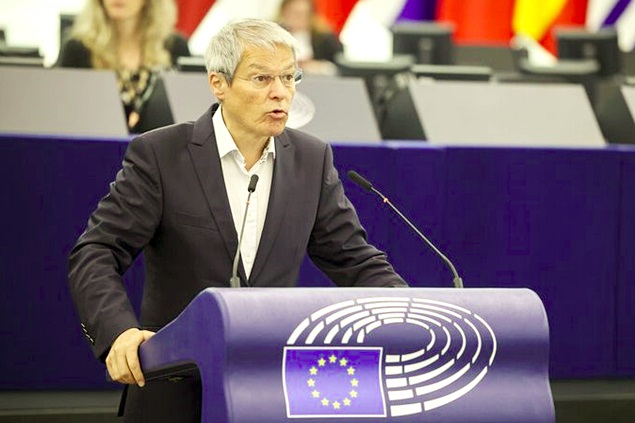1261

Decarbonizing agriculture and reducing its impact on the environment is not only a legitimate expectation of society but also a moral duty. However, the fragmented and ideologically oriented approach of the European Commission is not sufficient, stated Dacian Cioloș, quoted by Euractiv.
Uncertainty has become the new normal for the European agri-food sector
This adversely affects not only farmers and consumers but also the European Union's ability to remain competitive in the global market. The COVID-19 pandemic, the war between Russia and Ukraine, climate change, and extreme weather events have caused major disruptions in agri-food chains.
These crises have also shown that there is no strategic autonomy for the EU without food security and a strong European agricultural sector, and that food security goes beyond agriculture and food production, impacting multiple domains, not only primary producers but also the broader economy.
It refers not only to nutrition but also to health and the environment, trade, development, and humanitarian issues, even to the essence of the European social fabric. Food security is more than a matter of quantity produced. Accessibility remains a major issue, even for certain social categories within the EU.
A flawed method
In this complicated context, the EU continues to support the transition to a more ecological agricultural system that helps manage natural resources, maintain biodiversity, and combat climate change.
Decarbonizing agriculture and reducing its environmental impact, ensuring healthy food, is not only a legitimate expectation of society but a moral duty.
However, these goals primarily affect industrial agriculture, which forms a significant part of the European agri-food system, built and subsidized over decades, where farmers have been encouraged to produce intensively, sometimes with pressure on natural resources, at reduced costs. In short, a profound change and a terribly difficult transition.
Under these circumstances, in promoting climate and environmental legislation affecting agriculture, the European Commission has chosen the wrong method. A salami-slicing tactic that pushes for ideologically set targets, lacking solid impact assessments or, in some cases, without any impact assessment.
The current Commission has made fragmented decisions without a clear direction for this process and has distanced itself from the political consequences of the proposed changes.
It has also attempted to do this outside the European Union's Common Agricultural Policy (CAP), the main framework of European agriculture, diminishing its political and financial relevance. This has only increased suspicion among farmers across Europe, who fear that something is being done against them.
To make the current discussion even more complex, lab-grown meat and insects for human consumption have been added to the political agenda, thus opening Pandora's box. If, in normal times, these issues could have been less disruptive, in the current context, they are extremely political topics, questioning the system that allows new foods on the market and their social acceptability.
This method has hit a wall: in 2024, European elections are approaching, and extremists, populists, and anti-European parties are intensively manipulating some of the Commission's proposals.
Ukraine: new challenges, new opportunities
Political imperatives, legitimate not only in the context of the war with Russia but also for the future of the EU, are now on the table. As of June 2022, Ukraine is a candidate country for the EU, and in the near future, it will begin accession negotiations along with the Republic of Moldova.
From a political perspective, these negotiations cannot be delayed. It would not only be unfair but also unwise. This means that there will be a gradual integration of Ukraine into the European single market.
It is also likely that the EU will extend the current full liberalization for some key agricultural products, which helps maintain Ukraine's economy afloat and, in a later stage, support the country's reconstruction.
However, from the perspective of agricultural policy, integrating Ukraine into the EU's single market is by no means business as usual. Ukraine's accession to the EU, a global agricultural power, de facto questions the future of the current PAC's financial support model.
Ukraine is a top global producer and exporter of basic cereals. The EU's agri-food sector will undoubtedly be stronger with Ukraine in it, but the harsh truth is that the EU's Common Agricultural Policy today is not prepared to handle the accession of such a powerful agricultural force.
To accommodate Ukraine, we must fundamentally rethink the entire European farming policy, and we must start now. Once again, the risk is that populist and extremist movements will use the difficulties highlighted by farmers to fuel anti-European and anti-Ukrainian sentiments.
What path should we take?
These challenges also require a fundamental reset of how we shape European policies.
Food and nutrition, the environment and climate, agriculture and public health are closely interconnected. They should be addressed in an integrated manner, aligning them with trade, humanitarian aid, and international cooperation.
This new approach should be reflected not only in the political priorities for the 2024 European elections but also in the new institutional framework at the European level that will result from these elections, in how the future European Commission will be organized, and in the political decision-making process in the European Parliament.
A fundamental rethink of the current CAP model and related legislation will require extensive and concerted public debates, as well as solid and comprehensive impact assessments, considering economic factors, the impact on our food system, societal acceptance, and expectations.
A fragmented approach would lead to ideological political decisions, which are socially unacceptable or simply wrong.
In recent years, the EU has managed to become stronger through each crisis. What we need now is to move from crisis mode to a new, forward-looking vision for Europe's agricultural and food system. I am confident that we can achieve this.





